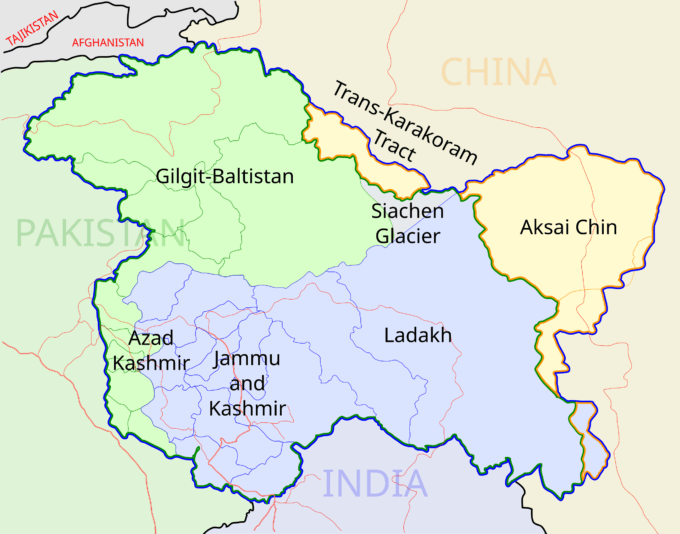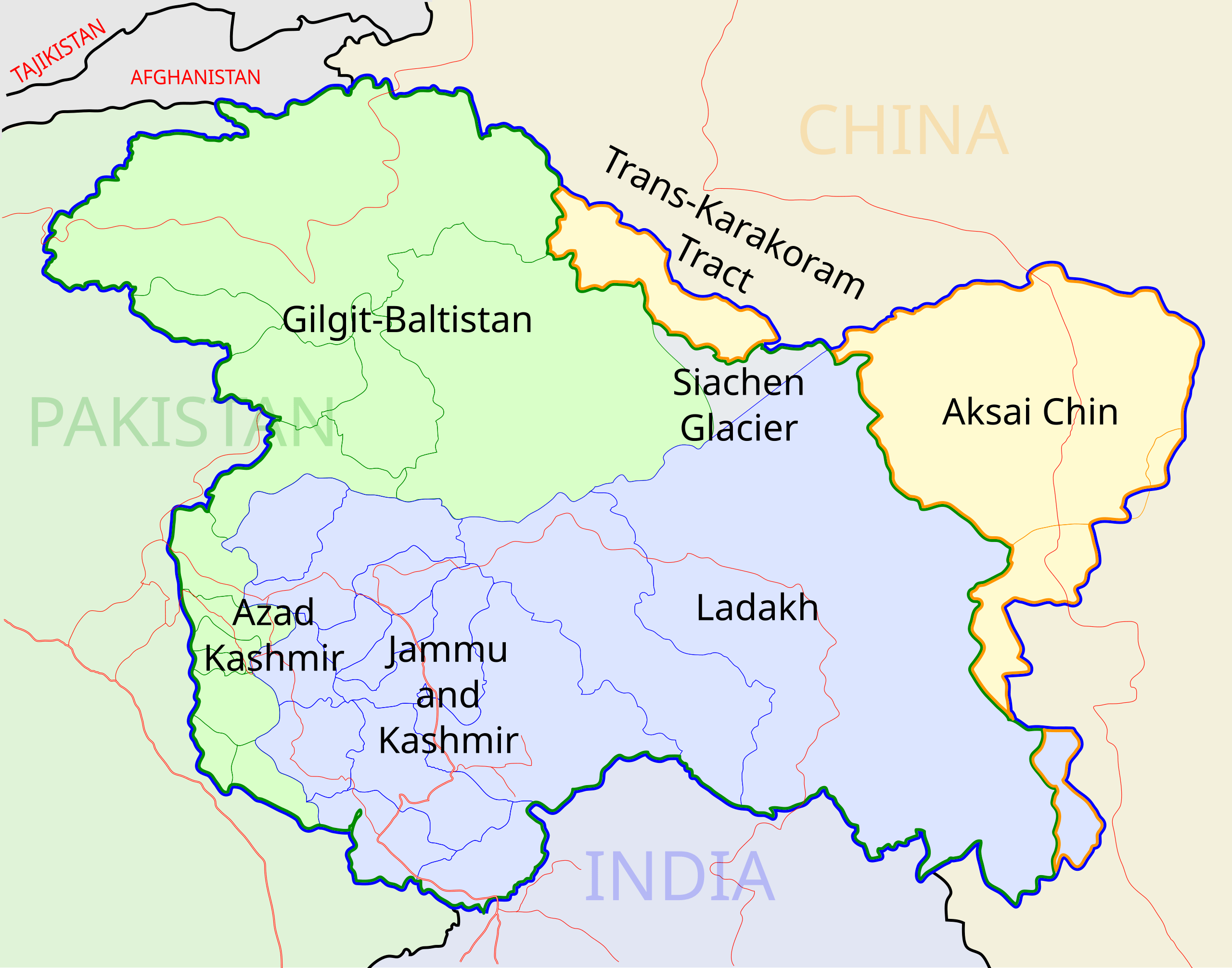
Map of the disputed region of Kashmir. Image Source: w:user:Planemad – Own work International Borders: University of Texas map library – CC BY-SA 3.0
Tension between India and Pakistan, following terrorists’ strike on tourists at Baisaran Valley, Pahalgam in India-controlled Jammu and Kashmir (JK) has raised possibility of the two heading for a war. Terrorists’ strike led to death of 26 tourists on April 22, 2025. India has held Pakistan as responsible for the Pahalgam terror attack while Pakistan has denied the charges. Since then, there is no denying that two countries have taken several steps suggesting that they are close to “war.” This includes India holding Indus Water Treaty in abeyance as per which the water of River Indus is shared by the two. Pakistan has responded by closing its air space to Indian airlines and suspending all trade with India. In addition, visa services have been halted, diplomats recalled and so forth. There has also been minor exchange between their soldiers along Line-of-Control (LoC), without any casualty. On the Indian side high-level security meetings being held also suggest that it is considering all options of a conflict with Pakistan.
Undeniably, India and Pakistan have hardly been ever at peace with each other. “Pakistan-Card” has time and again been used by Indian politicians to gain support and votes of Indians. Anti-Pakistan “war-cry” is still considered to be fairly popular and appealing for public by Indian leaders. They are guided by the assumption that this will contribute to enhancing their popularity among the people at large. The fact that present Indian government led by Bharatiya Janata Party (BJP) gives a lot of importance to its extremist religious card as well as it anti-Muslim communal propaganda cannot be ignored. With Pakistan being constitutionally an Islamic State, there prevails a communal bias in India of linking Muslims settled here with Pakistan. JK is a Muslim-dominated state. A similar bias prevails for Muslims here even though India has the second largest population of Muslims. In this context, usage of anti-Pak card by India cannot be politically de-linked from politicians’ attempt to play on several cards simultaneously; that of exciting anti-Muslim as well as anti-Pak passion among primarily the Indian Hindus. Roughly, eighty percent of Indian population is of Hindus.
Notwithstanding the reality that Indian public has come a long way from easily being entrapped by these political signals, it is possible that the present government is trying its best to make the most of Pahalgam-tragedy, politically as well as diplomatically. Let us accept it, Pahalgam has raised several questions about security lapses on the part of India. A leader has reportedly said that the valley- where terrorists struck- should not have been open to tourists. But if this was the case, tourists should not have been permitted to visit it. And security arrangements should have been made from the moment they started stepped in. Besides, as Pahalgam falls enroute an annual Hindu pilgrimage, which is scheduled to begin a few weeks from now, security preparations are expected to begin from around this time. In addition, the authorities are apparently well aware that terrorists can strike at any place in India, particularly JK, at any time, particularly tourist spots. Adequate security arrangements are naturally expected at the tourist spots in JK. Not surprisingly, majority of tourists-who survived the terrorists’ strike at Pahalgam- are raising the question as to why weren’t there any security arrangement there? Besides, the terrorists spent at least 20-30 minutes in their strikes. If there were security arrangements, they may have been gunned down, the minute they fired the first shot. Or they would not have openly targeted the tourists but would have fired from a hidden spot and tried rushing away within minutes.
Certainly, the Pahalgam-tragedy has been strongly criticized and has won India sympathy from greater part of the world. But this doesn’t mean, India has also received the “green” signal or would be supported if it heads for an open war with Pakistan. India and Pakistan have been asked to exercise “restraint” by United Nations and China. Saudi Arabia and Iran are trying to prevent an “escalation.” United States also prefers a “diplomatic” solution to the present war-like stage reached by India and Pakistan.
Prospects of either India or Pakistan being totally oblivious to these diplomatic signals may be viewed as minimal. Diplomatic ties between India and Pakistan have for the greater part bordered around the stage of tension they have entertained over various issues, particularly terrorism. Their differences over Kashmir remain far from being ever resolved. But yes, they have refrained from an open conflict from the day they stepped onto the nuclear path and chose to give greater importance to their nuclear diplomacy deterring them from this stage. In this context, heading for an open conflict would be equivalent to inviting criticism from opponents of their nuclear proliferation drive. This would spell a major setback to nuclear diplomacy entertained by the two shrewdly against apprehensions entertained by its opponents stating that this was equivalent to their heading towards MAD (Mutually Assured Destruction). Neither India nor Pakistan, however antagonist they may be towards each other, are keen to head in this direction.
But then what should be interpreted from signals suggesting that they are “really” heading towards “war?” Given that India and Pakistan have never entertained “friendly” ties, their not being engaged in war may be viewed as a positive, though hardly suggestive of cordial relations between the two. The fact that actors and singers of the two countries are fairly popular among the people of India and Pakistan only suggests that entertainment has helped bring them together. The fact that this has been affected to a degree cannot be ignored as Indian movies starring Pakistani actors have not been permitted release, channels with Pakistani dramas have been suspended for the time being and so forth. These may also be viewed as signals conveying the Indian leaders’ message to their public about their anti-Pak stand.
Rushing towards war would also amount to their ignoring diplomacy being exercised by United States and other powers keen for their exercising restraint. Leaders on both sides are probably also weighing options of how are their respective citizens and other countries reacting to the present Indo-Pak tension. War is certainly not going to ease the present tension or contribute in any way to resolving their long-standing disputes. Indian Prime Minister Narendra Modi would probably love to emerge as the winner and perhaps so would his Pakistani counterpart Shehbaz Sharif. War-diplomacy is likely to be given top-most priority by both the countries for a little more time. There is a difference between actually engaging in war or going for minor/selective war-strikes and opting for war-like diplomacy. The present stand being exercised by both is suggestive of their being engaged in war-like diplomacy by opting for strategic moves suggestive of their heading for war. Now, the question is for how long can such war-diplomacy be stretched? Either ways, it suggests failure of their nuclear diplomacy!
The post Indo-Pak War: A Failure of Nuclear Diplomacy? appeared first on CounterPunch.org.


